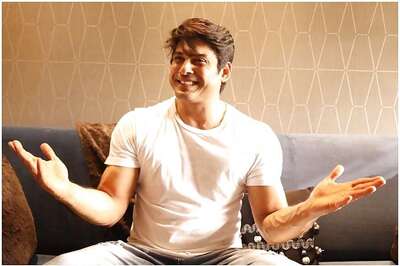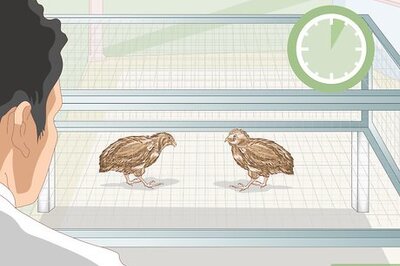
views
In one of his great essays on culture, especially the culture of Vienna which thrived on Jewish café wits who were also lawyers (Hugo Sperber), on cabaret performers who doubled up as writers (Egon Friedell), on journalists who were epigrammatists (Stefan George), Clive James came closest to describing his own literary performance -
‘Slightly lower down the scale of tickled ribs, there are witty lines that make you smile with appreciation — the smile that acknowledges how you almost laughed. On that level one can place many of Oscar Wilde’s best epigrams: the ones that are condensed without being leaden, and fashioned without being laboured. “Meredith is a sort of prose Browning, and so is Browning.” But much of the most valuable wit forms at a level where laughter is neither induced nor sought, and even a smile is not required: the level where a sense of rightness combines with a sense of neatness, and a nod of the head is enough to acknowledge the blend.’
In the same essay he said that a Soviet Union general with a bunch of medals pinned to his chest looked ‘like a pangolin with scales.’
About a British ballerina he wrote ‘She was so graceful that you went on seeing her with your eyes closed’.
On an occasion when he was addressing a packed audience in the Sydney Opera House and he found that ‘Even scarier than a full packed house, however, is a half-empty one’.
In a poem for Philip Larkin on his death — ‘Your saddest lyric is a social act’.
On theater critic and writer Kenneth Tynon — ‘In his early days a weakness was hard to find. In his very early days he was even better than that’.
On a bad review Kingsley Amis got for Lucky Jim after his death — ‘A review that amounted to placing a corpse under arrest and charging it with misspent life’.
He could also leave his reader in splits with his now famous description of Arnold Schwarzenegger as ‘a condom full of walnuts’ and compare the face of a small time TV star to ‘one of those car-sized fish that lurks deep below the reef, waiting to ingest the brass boot of a deep-sea diver’.
Clive James could sometimes give the impression that he never wrote sentences, only epigrams. That all his writing was - only a literary performance. But as he quotes Peter Altenberg in one of his essays, when the old Vienna wit was charged by one of his young lovers for being interested only in her (nur) body. ‘Altenberg asked, ‘Was ist so nur?” (What’s so only?)’
He once had a chance to design a set for Footlights, the Cambridge University dramatics club, and in the short time that was available, he decided to paint two epigrams. One of them was Wilde’s take on Robert Browning and the other was Duke Ellington’s ‘It don’t mean a thing if it ain’t got that swing’. If a writer ever had a credo, this was Clive James’ credo. It was a very seriously thought out take on what one's approach to culture and to writing should be. Or what it shouldn’t be - obscurantist. When you started writing only to impress your colleagues, when a composer went the way Schoenberg went in his later years, it marked the point of decline in arts.
‘His seemingly flippant remark goes to the heart of a long crisis in the arts in the twentieth century, and whether or not the crisis was a birth pang is still in dispute,’ James wrote about what the Duke had said.
And this principle governed how Clive James reviewed all writing and music that came his way. He did not think Miles Davis and John Coltrane had that swing. Neither did Sartre (‘in Sartre’s style of argument, German metaphysics met French sophistry in a kind of European Coal and Steel Community producing nothing but rhetorical gas’). Although in Sartre’s case there were other things as well. Like how he let the impression out that he was a resistance hero in the second world war when he clearly had done nothing except preserving himself. Or how Sartre felt that the Gulags were only incidental to the Soviet Union regime, whose clear excesses against its own citizens he never condemned. “And he couldn’t even play the Saxophone, goddamnit.”
But there may ultimately be no single underlying principle to judge all art. The idea of having a credo itself may be faulty. ‘It don’t mean a thing if it ain’t got that swing’ meant you were always on your toes, performing for the audience. It meant never being a bore. It meant writing sentences like this - ‘the heartening capacity of the tree of knowledge to replant itself in scorched earth does something to offset the depression induced by the spectacle of accumulated decades of bad conscience.’ It meant an aversion to academy, to literary theories, to a world of ideas where everything couldn’t possibly be simplified for the benefit of an audience.
Duke Ellington led him astray when Clive James met Walter Benjamin (‘He had an infallible ear for the kind of rhetoric whose only real subject is its own momentum’). But in at least one of his latter interviews, he admitted that he may have been wrong in his estimation of Benjamin, a fault that he hoped to correct in the follow-up to ‘Cultural Amnesia’. In his later years he was clearly making amends. ‘Not even Empson was clever enough to supersede the scholarly heritage, which was largely academic; and it will always be advisable for the beginning enthusiast, once he has finished mocking the academic world, to make his peace with it, and learn something,’ he wrote in a piece for ‘Poetry Notebook’.
But swing was all you needed to look for when it came to poems, which Clive James cherished quite a lot. He claimed to have committed to memory several poems by Auden, Larkin, Frost and Yeats, and there was no reason to doubt him. He had also memorised vast sections of Dante (which he later translated also) in the original and once had the chance of recounting at the most opportune moment a few words of it to one of the foremost most scholars of the Italian language - Gianfranco Contini (‘he was a quiet man and it was hard to make him laugh aloud’). Clive James, his wife and Contini were returning from an opera in Florence, and amid heavy downpour were trying to locate the house of the Italian philologist.
‘He was in the front passenger seat and I folded in the back. They talked scholarly stuff. As a continiana of impeccable credentials, my wife was well qualified for the colloquy, but she was no better than anyone else at driving blind. The rain was so heavy that we ended up going the wrong way. I remembered, and recited, a tag from Dante: Ché la diritta via era smarrita. Because the right way had been lost. Contini smiled from ear to ear, and when I added my regrets that I hadn’t written the line myself, he laughed aloud’.
The Australian writer, poet, critic, television host, cherished many such encounters in his essays. One of them involved the Russian poet Joseph Brodsky - ‘we both ended up standing on restaurant chairs clobbering each other with alexandrines. If the audience (they had started off as our dinner companions, but had grown resigned to being an audience) had been mainly monoglot, the performance would have been less forgivable. But even if all present understand only English – even if the day comes when the whole world understands only English - memorised poetry would still be the surest way of signalling a love of language’.
Clive James was arguably the best essayist of his generation. But if the future generations are to be introduced to him, I wish they begin with his poetry. That’s where he found the perfect form for his lifelong project of compressing thoughts into little crystals. Sometimes the form was songs which he composed for his friend Pete Atkin. I must have heard ‘Laughing Boy’ hundreds of times since I first came across it some five years ago. You can almost hear him laugh at each stanza of ‘Peregine Prykke’s Pilgrimage through the London Literary World’ where the hero of the mock epic poem meets ‘Seamus Feamus’, ‘FR Looseleaf’, ‘Norman Moonbase’ and ‘Kingsley Kong’.
Writing about another Viennese literary giant (Vienna was really at the centre of his ‘Cultural Amnesia’ and for good reasons) Arthur Schnitzler, he said that his ‘Book of Thoughts and Sayings’ ‘contains the summation of a lifetime’s introspection by a man who travelled into his own psychology with the same bravery that men later showed when they travelled into space. The difference is that everything he found was alive’. It was in his poems that Clive James sometimes also opened up with disturbing candour. There may not have been another way to express feelings such as he shared in ‘Stolen Children’.
‘The Standard says the missing girls are still
Not found. A man is held. The writers strain
The law’s pale letter, closing for the kill
As once the mob did, not far in the past.
Suppose he did it, don’t I know that face?
I shave it every morning. The same eyes
Plead innocent. In his case, one loose screw
Switched the desire a priest can’t neutralize
To children, and permitted him to do
What we don’t dream of even when God’s grace
Stuns us with glory walking in the sky.
…
Think of the fathers, praying. They must know
No one exists to listen who did not
Choose them for this, but where else can they ask
The same exemption all the others got
By chance? They beg for mercy from a mask.
Had it a mind, they’d not be weeping so.
Time to go home. The things I tried to tell
My own two daughters churn in my hot head.
The stranger won’t come on like Captain Hook.
He’ll laugh like me, crack jokes, yet want you dead.
Good story, Dad. I turn for one last look
At Paradise, and how we rose and fell.’
He said somewhere that the thing that came after gods showered you with theirs gifts was the responsibility to shape them. Clive James was often criticised for wasting his time on television instead of further sharpening his writerly skills. Why spend time interviewing Spice Girls, for instance, when you can work on the sequel to ‘Cultural Amnesia’? He answered this question at least twice. First in the fourth volume of his memoir ‘The Blaze of Obscurity’ —
‘The kind of television entertainment that I wanted to do could not be done without seriousness for bedrock, and I had large plans for pursuing my literary career in any spare time that I might happen to get. There was also a potential plus. Writing during my weeks off–they soon turned out to be days off, and then hours–I would have something extra to write about: personal experience of how the big-budget mass entertainment gets done. Going in, I had already guessed that it could never be done in solitude.’ He said that the ‘dough was a factor, but not decisive. What mattered was the adventure.’
He also answered this question in his Larkin poem, ‘A Valediction for Philip Larkin’ which he wrote when he learnt about one of his most favourite poets, with whom he exchanged many fond letters and whose reputation he passionately fought for when Larkin’s personal diaries, which could have put his poetry out of circulation forever, were published.
‘You were the one who gave us the green light
To get out there and seek experience,
Since who could equal you at sitting tight
Until the house around you grew immense?
Your bleak bifocal gaze was so intense,
…
But simply staying put makes no one you.
Those who can’t see the world in just one street
Must see the world. What else is there to do
Except face inescapable defeat
Flat out in a first-class reclining seat?’
It is hard to imagine what someone like him, who had millions of followers on television and who many great literary icons, from non-English cultures as well, regarded highly, had to do to make ends meet in his early years. One of those jobs was cleaning the cage of a tiger of a circus troupe. Though the tiger was ‘so old that only his stripes were holding him together, he had teeth that couldn’t dent the tennis ball with which he had been provided.’
From that tiger cage Clive James ended up travelling a long way forward, and sideways, feeling restless at each step. Sometimes the restlessness grew to a point where he found even individuals, nations and countries too minor for his appetite. He wanted to deal in centuries, in epochs. ‘Cultural Amnesia’ was a result of that labour as was his multi-part documentary on an entire century, cleverly pivoted on the increasingly popular desire to become famous ‘Fame in the 20th Century’.
Clive James came close to death back in 2010 when he was first diagnosed with Leukemia. ‘If you don’t know the exact moment when the lights will go out, you might as well read until they do.’ He knew that he was living on borrowed time. But he never stopped laughing and performing for his readers. He said he was
‘So full of fizzing pills that if you hit me
With a stick I would spill like a pinata
In a bon-bon shower of colours’
His essays became shorter. But even in the face of imminent death, or maybe because of it, he wrote something as life-affirming as ‘The River in the Sky’. Even death, he claimed in his epic poem, couldn’t come in the way of his writing.
‘If my ashes end up in an hourglass
I can go on working.
Patterns of gravity
Will look like writing.
Remember me, sings Dido’
There can perhaps be no better way to sign-off.




















Comments
0 comment